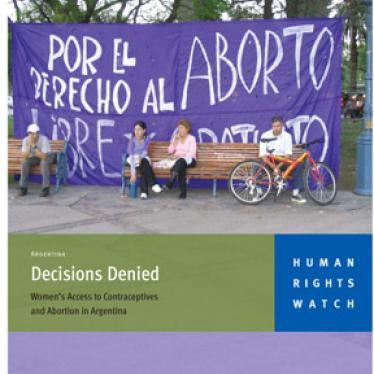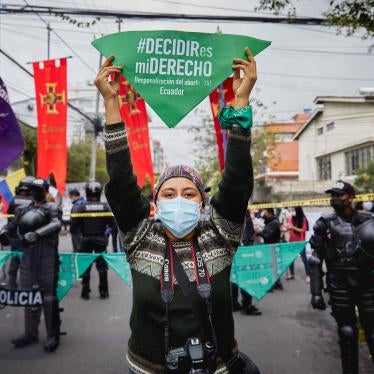Women in Argentina face arbitrary and discriminatory restrictions on their reproductive decisions and access to contraceptives and abortion. As a result, many women must choose between an unwanted or dangerous pregnancy and birth or an illegal and unsafe abortion that might seriously injure or even kill them. Approximately half a million illegal abortions occur every year in Argentina, according to the health ministry, representing 40 percent of all pregnancies. This extraordinarily high proportion of pregnancies ending in abortions is a graphic testament to women's lack of access to effective family planning information and services. Unsafe abortions have constituted the leading cause of maternal mortality in the country for decades. The tragic personal consequences of Argentina's restrictions on women's reproductive rights are documented in Human Rights Watch's report, "Decisions Denied: Women's Access to Contraceptives and Abortion in Argentina," which this fact-sheet summarizes.
Barriers to Contraceptives
Decisions about contraception are difficult and deeply personal. In Argentina, women are routinely prevented from making such decisions. Despite a promising national law on reproductive health, doctors and spouses continue to exercise control over women's reproductive health through laws and policies that subject female decision-making to arbitrary extraneous interference. Domestic and sexual violence constitute a persistent barrier for women trying to access contraceptives, not least because a significant number of abusive men deliberately sabotage their wife's or partner's access to contraceptives as part of the abuse. Another barrier is blatantly inaccurate or misleading information, too often propagated by health care workers themselves. In addition, many women simply cannot afford contraceptives and government promises of assistance often do not reach those who need it most. Access to one of the most effective forms of contraception-female sterilization-continues to be subject to arbitrary and discriminatory government limitations. To add insult to injury, public health officials sometimes require women to seek judicial authorization for tubal ligations even when the women fulfill all stated requirements, in further violation of their rights.
In 2003, the government began implementing a much-needed national program on reproductive health, backed by a public information campaign in 2005. While effective implementation of this program and other existing laws and policies could go a long way toward addressing the concrete harms described in the report, legal reform is necessary in the long run.
Criminalization of Abortion
When women are unable or unwilling to carry an unwanted pregnancy to term, the only option for many is an illegal and therefore unsafe abortion. Abortion is a crime in Argentina, though the penalty may be waived if the life or health of the pregnant woman is in danger or the pregnancy is the result of the rape of a mentally disabled woman. In practice, such "non-punishable" abortions are rare because there are no clear policies regulating access. The criminalization of abortion enables clandestine abortion "clinics" to operate with little regard for women's health and lives. It also leads women to take desperate measures, such as attempting to abort with knitting needles, rubber tubes, parsley sprigs, or the use of abortive medicines without medical assistance. When women hemorrhaging or suffering from life-threatening infections or injuries caused by botched abortions show up at public hospitals, health care personnel sometimes scorn them and deny them treatment. Doctors performing post-abortion curettage-the highly painful scraping of a woman's uterus with a sharp instrument-sometimes do so without anesthesia. Women who fear criminal prosecution after undergoing illegal abortions are discouraged from seeking necessary post-abortion care, often to the serious detriment of their health.
In 2005, the government issued a guide on the provision of humane, fast, and effective post-abortion care. In doing so, the government recognized that access to adequate post abortion care could limit some of the loss of life and other preventable health consequences of illegal abortion in Argentina today. However, if Argentina is to fulfill its international obligations on women's human rights, reform is urgently needed to ensure women's access to safe and legal abortion.
Recommendations
To the Government of Argentina
Human Rights Watch calls on Argentina's government to protect women's human rights to health, life, nondiscrimination, privacy, physical integrity, information, liberty, freedom of religion and conscience, equal enjoyment of rights, equal protection under the law, and the right to make decisions about the number and spacing of children. Ultimately, to comply fully with its international human rights obligations Argentina must undertake longer-term legal and policy reforms to legalize abortion and eradicate violence against women. In the short term, the Argentine government can and must immediately address the egregious violations documented in "Decisions Denied" by:
- Ensuring women's access to complete, accurate, and timely information about contraceptives;
- Providing women's access to a full range of contraceptives-including sterilization;
- Guaranteeing access to voluntary safe abortion where the penal code waives the punishment;
- Ensuring access to humane post-abortion care without fear of criminal charges; and
- Expediting the ratification, without reservations, of the Optional Protocol to the Convention on the Elimination of All Forms of Discrimination against Women.
Conclusion
Denying women the ability to make independent decisions about the use of contraceptives and about abortion amounts to a violation of their human rights. Even those who favor Argentina's restrictive legal regime on abortion should be given pause by the heart-wrenching personal accounts on the disastrous consequences of the criminalization of abortion described in "Decisions Denied." The government must ensure women's access, in law and in practice, to contraceptives and related information and to safe, legal abortion. For all women, this is a question of equality. For some, it is a question of life or death.






